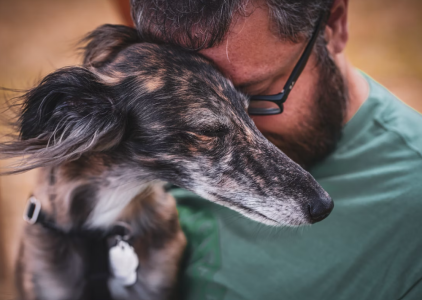Discover how a pet-friendly community could transform your senior living experience
- Replies 0
For many older adults, the companionship of a pet can be life-changing.
The simple act of waking up to a wagging tail or a gentle purr brings structure to the day and comfort to the heart.
In recent years, more senior living communities have opened their doors to animals, creating spaces where love, laughter, and purpose come naturally.
This shift has not only helped residents adjust to new surroundings but has also strengthened the bonds between neighbors.
Loneliness is one of the most pressing issues facing many older adults today.
Studies show that social isolation can be as harmful to health as smoking or obesity, increasing the risk of heart disease, depression, and even cognitive decline.
But there’s good news—senior living communities are stepping up, not just with care and amenities, but with vibrant social opportunities and, increasingly, a warm welcome for pets.
A recent US News survey found that residents in pet-friendly senior communities report higher levels of happiness, engagement, and overall well-being.
It’s not just about having someone to talk to (though that’s important!); it’s about feeling needed, having a daily routine, and sharing unconditional love.

Take the story of Laurel Sass, an 83-year-old resident of Waltonwood Providence in Charlotte, North Carolina. After losing her husband and weathering the storms—literal and figurative—of living alone, Laurel found herself craving connection.
Enter Lucky Lad, a spirited cat she adopted through a partnership between her community and the Humane Society of Charlotte.
“He gives me purpose,” Laurel says. “Lucky wakes me up every morning and is something to rely on. I love him, and he loves me back.”
Lucky isn’t just a companion—he’s a conversation starter, a source of laughter, and even a little bit of a local celebrity.
Friends drop by to play with him, and he’s always ready to greet visitors (or alert Laurel when someone’s at the door).
In many ways, Lucky has helped Laurel—and her neighbors—feel more at home.
It’s not just about cute Instagram moments (though there are plenty of those).
Senior living communities across the country are recognizing the profound benefits of welcoming pets:
Residents can bake treats, assemble care packages, or even help with animal socialization—activities that foster both community spirit and personal fulfillment.
Also read: Thinking of adopting a pet for mental health? This woman’s experience with her cat might surprise you
While puppies and kittens are adorable, older pets are often the unsung heroes of the adoption world. For seniors, they’re a perfect match:

The benefits don’t stop at the apartment door. In pet-friendly communities, animals become part of the social fabric.
They spark conversations in the hallway, inspire group activities, and even help staff and residents bond.
At Waltonwood, for example, the “Bark Bar” isn’t just a treat cart—it’s a rolling party, complete with a canine “Barktender” (the marketing manager’s rescue dog, Sheldon).
Residents gather to share stories, swap pet care tips, and enjoy a few laughs. It’s these little moments that turn neighbors into friends.
Also read: Hearts melt as siblings comfort their 17-year-old dog who can no longer chase squirrels
If you’re considering a move—or helping a loved one explore options—here are a few things to keep in mind:

Have you found joy in a pet-friendly community? Do you have a heartwarming story about a senior pet who changed your life? Or maybe you’re considering a move and have questions about what to expect?
The simple act of waking up to a wagging tail or a gentle purr brings structure to the day and comfort to the heart.
In recent years, more senior living communities have opened their doors to animals, creating spaces where love, laughter, and purpose come naturally.
This shift has not only helped residents adjust to new surroundings but has also strengthened the bonds between neighbors.
Loneliness is one of the most pressing issues facing many older adults today.
Studies show that social isolation can be as harmful to health as smoking or obesity, increasing the risk of heart disease, depression, and even cognitive decline.
But there’s good news—senior living communities are stepping up, not just with care and amenities, but with vibrant social opportunities and, increasingly, a warm welcome for pets.
A recent US News survey found that residents in pet-friendly senior communities report higher levels of happiness, engagement, and overall well-being.
It’s not just about having someone to talk to (though that’s important!); it’s about feeling needed, having a daily routine, and sharing unconditional love.

The presence of animals provides comfort while also encouraging healthier lifestyles and stronger connections. Image source: Jackie Best / Unsplash
Take the story of Laurel Sass, an 83-year-old resident of Waltonwood Providence in Charlotte, North Carolina. After losing her husband and weathering the storms—literal and figurative—of living alone, Laurel found herself craving connection.
Enter Lucky Lad, a spirited cat she adopted through a partnership between her community and the Humane Society of Charlotte.
“He gives me purpose,” Laurel says. “Lucky wakes me up every morning and is something to rely on. I love him, and he loves me back.”
Lucky isn’t just a companion—he’s a conversation starter, a source of laughter, and even a little bit of a local celebrity.
Friends drop by to play with him, and he’s always ready to greet visitors (or alert Laurel when someone’s at the door).
In many ways, Lucky has helped Laurel—and her neighbors—feel more at home.
It’s not just about cute Instagram moments (though there are plenty of those).
Senior living communities across the country are recognizing the profound benefits of welcoming pets:
- Emotional Support: Pets offer comfort, reduce anxiety, and help ease the transition to a new living environment.
- Physical Health: Walking a dog or playing with a cat encourages movement, which is great for mobility and heart health.
- Social Connection: Pets are natural icebreakers, helping residents bond over shared interests and stories.
- Routine and Purpose: Caring for an animal adds structure to the day and a sense of responsibility that many find deeply rewarding.
Residents can bake treats, assemble care packages, or even help with animal socialization—activities that foster both community spirit and personal fulfillment.
Also read: Thinking of adopting a pet for mental health? This woman’s experience with her cat might surprise you
While puppies and kittens are adorable, older pets are often the unsung heroes of the adoption world. For seniors, they’re a perfect match:
- House-Trained and Mellow: Older pets are usually past the chewing, scratching, and midnight zoomies stage. They’re content to nap, cuddle, and enjoy a slower pace.
- Predictable Personalities: What you see is what you get—no surprises!
- Mutual Rescue: As mental health expert Aniesa Hanson puts it, “Seniors often feel a special connection with older pets since both are in later stages of life, which can feel deeply validating and mutually comforting.”

When adopted by a senior, they gain stability, love, and a second chance at happiness. Image source: Rusty Williams / Charlotte Magazine
The benefits don’t stop at the apartment door. In pet-friendly communities, animals become part of the social fabric.
They spark conversations in the hallway, inspire group activities, and even help staff and residents bond.
At Waltonwood, for example, the “Bark Bar” isn’t just a treat cart—it’s a rolling party, complete with a canine “Barktender” (the marketing manager’s rescue dog, Sheldon).
Residents gather to share stories, swap pet care tips, and enjoy a few laughs. It’s these little moments that turn neighbors into friends.
Also read: Hearts melt as siblings comfort their 17-year-old dog who can no longer chase squirrels
If you’re considering a move—or helping a loved one explore options—here are a few things to keep in mind:
- Pet Policies: Every community is different. Some welcome all pets, while others have size or breed restrictions. Ask about pet fees, designated walking areas, and on-site amenities.
- Support Services: Look for communities that offer pet care assistance, especially if mobility is a concern.
- Adoption Partnerships: Some communities, like Waltonwood, partner with local shelters to make pet adoption easy and affordable.
- Community Culture: Visit during a pet-friendly event or ask to meet current residents (and their pets!) to get a feel for the atmosphere.
- Choose the Right Pet: Consider your lifestyle, energy level, and any health concerns. Older pets are often a great fit.
- Prepare Your Space: Make sure your new home is safe and comfortable for your furry friend.
- Get Involved: Join pet-related activities, volunteer at local shelters, or simply take a stroll with your new companion—you’ll be amazed at how quickly you make friends.
- How adopting a senior pet could change your life in unexpected ways
- How senior dogs and seniors are finding new purpose together
Key Takeaways
- Pet-friendly senior living communities, like Waltonwood Providence, provide companionship and purpose to residents through pet adoption initiatives, creating a mutually beneficial relationship for both seniors and animals.
- Older adults adopting senior pets experience emotional benefits such as reduced loneliness, increased daily structure and overall improvement in wellbeing, while older animals gain stable, loving homes.
- Engagement in pet-based activities—like baking treats, shelter volunteering, and community events—helps foster social interaction among residents and staff, benefiting mental health and encouraging community spirit.
- The bond between senior pets and residents offers mutual comfort and practical support, such as companionship and even alerting owners to visitors, further enhancing residents’ sense of safety and belonging.






